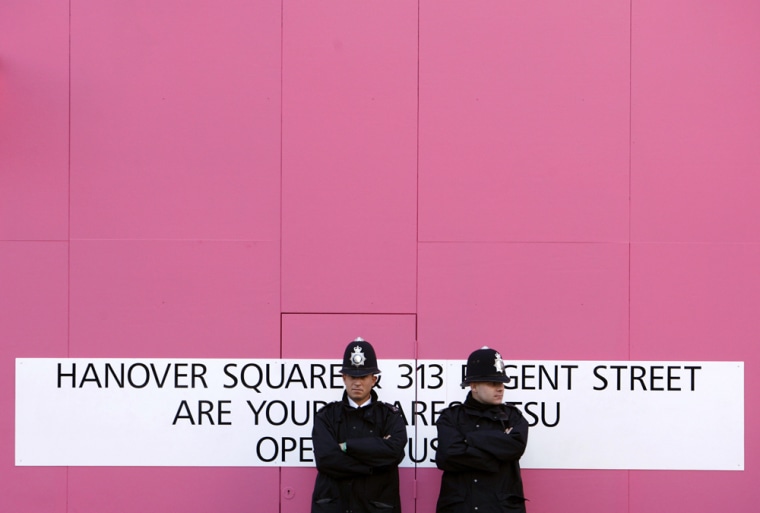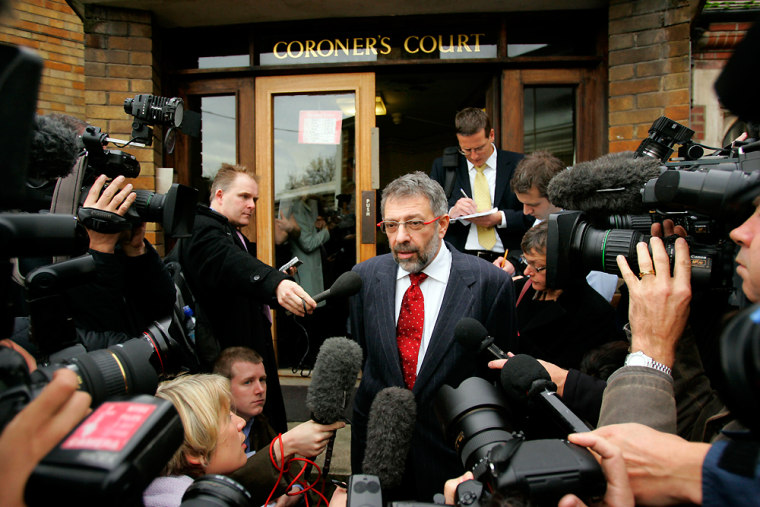Traces of radiation have been found at a dozen sites in Britain and five jets were being investigated for possible contamination as authorities widened their investigation into the poisoning of a former Russian spy, the country’s top law enforcement official told Parliament on Thursday.
A coroner formally opened an inquest into the poisoning of Alexander Litvinenko, who died on Nov. 23 after falling ill more than three weeks earlier. It was quickly adjourned so police could continue their investigation, but three pathologists were expected to participate in an autopsy Friday at Royal London Hospital.
In Moscow, meanwhile, doctors said they believed Yegor Gaidar, a former premier and head of a liberal opposition party, may also have been poisoned during a conference Nov. 24 in Ireland, his spokesman Valery Natarov told The Associated Press.
Gaidar, 50, became violently ill and was rushed to a hospital in Ireland, but has since returned to Russia where he was improving.
Cause of Gaidar's illness unknown
Natarov told the AP that doctors were unable to “detect any natural substance known to them” in Gaidar’s body, leading them to believe he may have been poisoned. However, they have not been able to determine what caused specifically his illness and have asked medical experts in Ireland for more information on his condition immediately after he became sick.
A spokeswoman for the Irish Department of Foreign Affairs, speaking on customary condition of anonymity, said Thursday it had not been contacted by the Russian authorities about the doctors’ opinions. A day earlier, the department said authorities had “received no evidence of anything untoward” about the case.
High doses of polonium-210 — a rare radioactive element usually made in specialized nuclear facilities — were found in Litvinenko’s body after his death. Investigators are now checking places visited by the former KGB agent and others who had contact with him in the weeks before he fell ill on Nov. 1.
‘Around 24’ sites checked out
Home Secretary John Reid told Parliament that “around 24 venues” have been or are being monitored as part of the investigation, and that experts had confirmed traces of radioactive contamination at “around 12 of these venues.” He did not say whether the radioactivity found at the sites was polonium-210.
Reid told lawmakers that officials believed the risk to public health to be low. He said 1,700 calls had been made to the National Health Service, and 69 people were referred to the Health Protection Agency.
Of those, 18 who may have been exposed to polonium-210 have been referred to specialist clinics, but all urine tests so far have been negative, he said.
Planes scoured for clues
Litvinenko also said before he died that a group of Russian contacts who met with him on Nov. 1 had traveled to London from Moscow, prompting the searches of planes.
Three British Airways planes — two at Heathrow Airport and one in Moscow — are being investigated, and Reid said that a Boeing 737, leased by the Russian airline Transaero, was also “of interest.”
Besides that, “there is one other Russian plane that we know of that we think we may be interested in,” Reid added. He did not elaborate, except to say that it is Russian.
He said early tests of two of the three British Airways planes showed low levels of a radioactive substance. The third BA plane remains on the ground in Moscow, and has not yet been tested. BA will make a decision whether to bring the plane back from Moscow, he said.
The Transaero jet arrived at Heathrow from Moscow on Thursday, and airline officials said no radioactivity was discovered aboard. “Local security did not find on Transaero planes any toxic substance,” said Irena Borodulina, a spokeswoman for Transaero.
More radiation checks
The Russian Transport Ministry announced increased radiation checks on international flights and at international airports across the country Thursday.
The three British planes were on the London-Moscow route, but also made stops in Barcelona, Frankfurt and Athens over a period of three weeks. Thousands of passengers aboard some 200 flights have been asked to report any symptoms of radiation poisoning.
It was not immediately clear whether the traces found onboard could have come from passengers who may have come into contact with Litvinenko, or whether a radioactive substance could have been smuggled on board. Authorities refused to specify whether the substance found was polonium-210.
Around 33,000 passengers and 3,000 crew and airport personnel had contact with the 221 flights on the three British planes, said airline spokeswoman Kate Gay. She said the government contacted the airline but would not say what aroused its suspicions.
UK carrier: ‘Risk to public health is low’
British Airways has said that “the risk to public health is low,” but it has published a list of the flights affected on its Web site and told customers on these flights to contact a special help-line set up by the Health Ministry.
International Atomic Energy Agency spokeswoman Melissa Fleming said Britain has not asked the U.N. watchdog agency for help in tracing the polonium, “but we stand ready to assist, and we communicated that.”

The 43-year-old Litvinenko, a fierce Kremlin critic, had blamed Russian President Vladimir Putin for his poisoning from his deathbed.
He told police he believed he had been targeted for investigating the October killing of Russian journalist Anna Politkovskaya, another critic of Putin’s government who was gunned down in her Moscow apartment building.
Moscow denies involvement
The Russian government has denied any involvement in either death.
Gaidar, a liberal economist whose moderate criticism of the Kremlin is largely limited to economic issues, served briefly as prime minister in the 1990s under President Boris Yeltsin in post-Soviet Russia’s most liberal and democratically oriented government. While he is one of the leaders of a liberal political party, liberals have been severely sidelined under Putin and he is not prominent.
Gaidar is unpopular among many Russians who blame the Western-backed economic policies he pursued as prime minister for the decline in their living standards following the Soviet collapse.
His daughter, Maria, is a well-known liberal youth activist and vociferous Kremlin critic.
